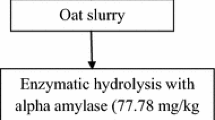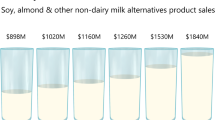Abstract
Probiotics are known to human kind since ages as they are important component in fermented milk products, however the use of probiotics in non-dairy product is a novel method for the delivery of probiotics. Delivery of probiotics through non-dairy products will be beneficial for consumers who are lactose intolerant who are deprived of benefits of probiotics by dairy products. This studies aim at developing novel vegetable juices containing probiotic bacteria. Three different strains of bacteria have been used, i.e. Lactobacillus plantarum, Lactobacillus acidophilus, Lactobacillus delbrueckii in carrot, beetroot and tomato juice. The viability of the bacteria has been checked after a specific duration of time of fermentation by Koch’s plate count method. The vegetable used for juices (carrot, beetroot, tomato) consist of high amount of antioxidants like carotenoids in carrot, betaxanthins and betacyanins in beetroot, lycopene in tomato. These antioxidant provide numerous health benefits to human body. The antioxidant activity in the juices has been checked before and after fermentation by HPLC and spectroscopic methods. The three bacterial strains Lactobacillus plantarum, Lactobacillus acidophilus and Lactobacillus delbrueckii used in three types of juices including tomato juice, carrot juice and beetroot juice showed good growth except Lactobacillus acidophilus due to reasons like insufficient nutrients. The amount of sugars and acids of the three juices indicated that the fermentation process takes place at a good and satisfying rate. This product will be especially useful for the people who are lactose intolerant who cannot intake probiotics via milk and milk products. Vegetable juices also have almost zero fat content and high in fiber so the people who are on a fat free diet can consume this product.




Similar content being viewed by others
References
Anjum N, Maqsood S, Masud T, Ahmad A, Momin A (2014) Lactobacillus acidophilus: Characterization of the species and application in food production. Crit Rev Food Sci Nutr 54(9):1241–1251. https://doi.org/10.1080/10408398.2011.621169
Aween MM, Hassan Z, Muhialdin BJ, Noor HM, Eljamel YA (2012) Evaluation on antibacterial activity of Lactobacillus acidophilus strains isolated from honey. Am J Appl Sci 9(6):807–817. https://doi.org/10.3844/ajassp.2012.807.817
Butel MJ (2013) Probiotics, gut microbiota and health. Med Mal Inf 44(1):1–8. https://doi.org/10.1016/j.medmal.2013.10.002
Chambial S, Dwivedi S, Shukla KK, John PJ, Sharma P (2013) Vitamin C in disease prevention and cure: an overview. Ind J Clin Biochem 28(4):314–328. https://doi.org/10.1007/s12291-013-0375-3
de Sá MC, Rodriguez-Amaya DB (2004) Optimization of HPLC Quantification of carotenoids in cooked green vegetables—comparison of analytical and calculated data. J Food Compos Anal 17:37–51. https://doi.org/10.1016/S0889-1575(03)00100-5
de Vries MC, Vaughan EE, Kleerebezem M, de Vos WM (2006) Lactobacillus plantarum—survival, functional and potential probiotic properties in the human intestinal tract. Int Dairy J 16:1018–1028. https://doi.org/10.1016/j.idairyj.2005.09.003
El-Sayed AA, Rabie MA, El-Maaty SAM, El-Nemr SEA (2018) Fermented tomato juice (Lycopersicon esculentum Mill.) produced via lactic acid bacteria during cold storage. Carpathian J Food Sci Technol 10(1):5–18. https://doi.org/10.13140/RG.2.2.28590.41287
Fernandes Pereira AL, Rodrigues S (2018) Chapter 15 - turning fruit juice into probiotic beverages. In: Rajauria G, Tiwari BK (eds) Fruit juices. Academic Press, pp 279–287. https://doi.org/10.1016/B978-0-12-802230-6.00015-1
Georgieva R, Iliev I, Haertlé T, Chobert JM, Ivanova I, Danova S (2009) Technological properties of candidate probiotic Lactobacillus plantarum strains. Int Dairy J 19:696–702. https://doi.org/10.1016/j.idairyj.2009.06.006
Guo X, Zhao J, Wang R, Zhang H, Xing B, Naeem M, Yao T, Li R, Xu R, Zhang Z, Wu J (2021) Effects of graphene oxide on tomato growth in different stages. Plant Physiol Biochem 162:447–455. https://doi.org/10.1016/j.plaphy.2021.03.013
Hamid AA, Aiyelaagbe OO, Usman LA, Ameen OM, Lawal A (2010) Antioxidants: Its medicinal and pharmacological applications. Afr J Pure Appl Chem 4(8):142–151. https://doi.org/10.5897/AJPAC.9000020
Horáčková Š, Rokytová K, Bialasová K, Klojdová I, Sluková M (2018) Fruit juices with probiotics—new type of functional foods. Czech J Food Sci 36(4):284–288. https://doi.org/10.17221/39/2018-CJFS
Khan S, Ud-Din A, Ali GM, Khan SI, Arif I, Riaz MN, Ghazanfar S (2020a) Screening of lactic acid bacteria for their use as buffalo probiotic. J Anim Plant Sci 30(6):1357–1365. https://doi.org/10.36899/JAPS.2020.6.0155
Khan M, Anjum AA, Nawaz M, Awan AR (2020b) In vitro characterization of probiotic properties and anti Campylobacter activity of Lactobacillus spp. Isolated from poultry, fermented foods and human faeces. J Anim Plant Sci 30(2):336–344. https://doi.org/10.36899/JAPS.2020.2.0053
Korus A, Bernaś E, Korus J (2021) Health-promoting constituents and selected quality parameters of different types of kimchi: fermented plant products. Int J Food Sci. https://doi.org/10.1155/2021/9925344 (Article ID 9925344)
Kun S, Rezessy-Szabo JM, Nguyen QD, Hoschke A (2008) Changes of microbial population and some components in carrot juice during fermentation with selected Bifidobacterium strains. Process Bioch 43(8):818–820. https://doi.org/10.1016/j.procbio.2008.03.008
Kurilich AC, Jeffery EH, Juvik JA, Wallig MA, Klein BP (2002) Antioxidant capacity of different broccoli (Brassica oleracea) genotypes using the oxygen radical absorbance capacity (ORAC) assay. J Agric Food Chem 50:5053–5057. https://doi.org/10.1021/jf025535l
Li H, Huang J, Wang Y, Wang X, Ren Y, Yue T, Wang Z, Gao Z (2021) Study on the nutritional characteristics and antioxidant activity of dealcoholized sequentially fermented apple juice with Saccharomyces cerevisiae and Lactobacillus plantarum fermentation. Food Chem 363:130351. https://doi.org/10.1016/j.foodchem.2021.130351
Mousavi ZE, Mousavi SM, Razavi SH, Hadinejad M, Emam-Djomeh Z, Mirzapour M (2013) Effect of fermentation of pomegranate juice by Lactobacillus plantarum and Lactobacillus acidophilus on the antioxidant activity and metabolism of sugars, organic acids and phenolic compounds. Food Biot 27:1–13. https://doi.org/10.1080/08905436.2012.724037
Naeem M, Muqarab R, Waseem M (2019) The Solanum melongena COP1 delays fruit ripening and influences ethylene signaling in tomato. J Plant Physiol 240:152997. https://doi.org/10.1016/j.jplph.2019.152997
Nguyen TDT, Kang JH, Lee MS (2007) Characterization of Lactobacillus plantarum PH04, a potential probiotic bacterium with cholesterol-lowering effects. Inter J Food Microbiol 113:358–361. https://doi.org/10.1016/j.ijfoodmicro.2006.08.015
Panghal A, Virkar K, Kumar V, Dhull SB, Gat Y, Chhikara N (2017) Development of probiotic beetroot drink. Cur Res Nutr Food Sci 5(3):257–262. https://doi.org/10.12944/CRNFSJ.5.3.10
Paredes JL, Escudero-Gilete ML, Vicario IM (2022) A new functional kefir fermented beverage obtained from fruit and vegetable juice: development and characterization. LWT Food Sci Technol 154:112728. https://doi.org/10.1016/j.lwt.2021.112728
Peñas E, Frias J, Sidro B, Vidal-Valverde C (2010) Chemical evaluation and sensory quality of Sauerkrauts obtained by natural and induced fermentations at different NaCl levels from Brassica oleracea Var. capitata Cv. Bronco grown in Eastern Spain. Effect of storage. J Agric Food Chem 58(6):3549–3557. https://doi.org/10.1021/jf903739a
Priecina L, Karklina D (2015) Composition of major organic acid in vegetable and spices. CBU Int Conf Proc 3(0):447–454. https://doi.org/10.12955/cbup.v3.637
Ranadheera CS, Vidanarachchi JK, Rocha RS, Cruz AG, Ajlouni S (2017) Probiotic delivery through fermentation: dairy vs. non-dairy beverages. Fermentation 3(4):67–84. https://doi.org/10.3390/fermentation3040067
Re R, Pellegrini N, Proteggente A, Pannala A, Yang M, Rice-Evans C (1999) Antioxidant activity applying an improved ABTS radical cation decolorization assay. Free Radic Biol Med 26(9–10):1231–1237. https://doi.org/10.1016/s0891-5849(98)00315-3
Saqib S, Zaman W, Ayaz A, Habib S, Bahadur S, Hussain S, Muhammad S, Ullah F (2020) Postharvest disease inhibition in fruit by synthesis and characterization of chitosan iron oxide nanoparticles. Biocatal Agri Biotechnol 28:101729. https://doi.org/10.1016/j.bcab.2020.101729
Sheehan VM, Ross P, Fitzgerald GF (2007) Assessing the acid tolerance and the technological robustness of probiotic cultures for fortification in fruit juices. Innov Food Sci Emerg Technol 8:279–284. https://doi.org/10.1016/j.ifset.2007.01.007
Wang C-Y, Ng C-C, Su H, Tzeng W-S, Shyu Y-T (2009) Probiotic potential of noni juice fermented with lactic acid bacteria and bifidobacteria. Int J Food Sci Nutr 60(suppl6):98–106. https://doi.org/10.1080/09637480902755095
Wang Y, Wu J, Lv M, Shao Z, Hungwe M, Wang J, Bai X, Xie J, Wang Y, Geng W (2021) Metabolism characteristics of lactic acid bacteria and the expanding applications in food industry. Front Bioeng Biotechnol. https://doi.org/10.3389/fbioe.2021.612285
Wootton-Beard PC, Ryan L (2011) A beetroot juice shot is a significant and convenient source of bioaccessible antioxidants. J Funct Foods 3:329–334. https://doi.org/10.1016/j.jff.2011.05.007
Yoon KY, Woodams EE, Hang YD (2006) Production of probiotic cabbage juice by lactic acid bacteria. Biores Technol 97:1427–1430. https://doi.org/10.1016/j.biortech.2005.06.018
Funding
The authors received no financial support for the research, authorship and publication of this article.
Author information
Authors and Affiliations
Contributions
All authors contributed to the study conception and design. Material preparation, data collection and analysis were performed by [KG], [KD] and [ER-K]. The first draft of the manuscript was written by [KG] and all authors commented on previous versions of the manuscript. All authors read and approved the final manuscript.
Corresponding author
Ethics declarations
Conflict of interest
Author (Kamila Goderska) declares that she has no conflict of interest. Author (Kanan Dombhare) declares that she has no conflict of interest. Author (Elżbieta Radziejewska-Kubzdela) declares that she has no conflict of interest.
Ethics approval
This article does not contain any studies with human participants or animals performed by the author.
Consent to participate
Informed consent not applicable.
Additional information
Communicated by Erko Stackebrandt.
Publisher's Note
Springer Nature remains neutral with regard to jurisdictional claims in published maps and institutional affiliations.
Supplementary Information
Below is the link to the electronic supplementary material.
Rights and permissions
About this article
Cite this article
Goderska, K., Dombhare, K. & Radziejewska-Kubzdela, E. Evaluation of probiotics in vegetable juices: tomato (Solanum lycopersicum), carrot (Daucus carota subsp. sativus) and beetroot juice (Beta vulgaris). Arch Microbiol 204, 300 (2022). https://doi.org/10.1007/s00203-022-02820-1
Received:
Revised:
Accepted:
Published:
DOI: https://doi.org/10.1007/s00203-022-02820-1




